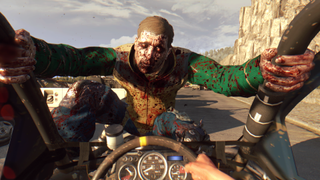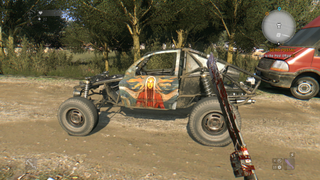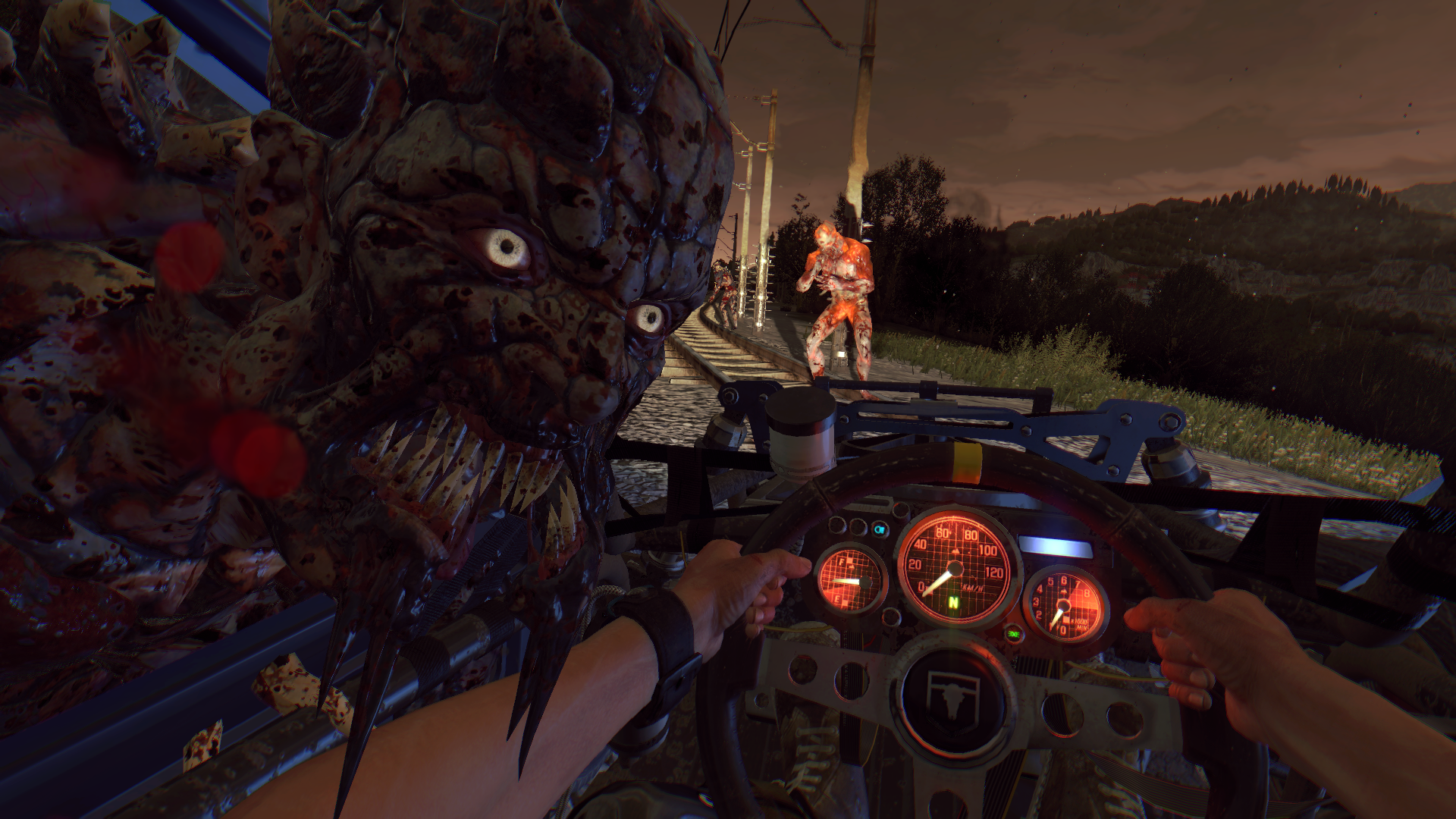Our Verdict
A big ol chunk of game with a lot of things to do, and just as importantly, new ways to do them.
PC Gamer's got your back
What is it? An expansion to Dying Light that adds a countryside map and a car and one million more zombies you can run over with the car
Expect to pay: $20/£16
Developer: Techland
Publisher: Warner Bros.
Reviewed on: Intel i7 x980 3.33 GHz, 9 GB RAM, Nvidia GeForce GTX 960
Multiplayer: Co-op
Link: Official Site
I didn’t exactly love free-running zombie FPS Dying Light—I thought it was good, not great—and having logged some 40 hours of dashing, clambering, climbing, and bludgeoning, I needed a change of pace to energize my return. Techland has delivered one with its meaty, speedy expansion, The Following, which moves the undead terror from the city to the countryside and puts you behind the wheel of a rusty, ramshackle, zombie-smashing car. Am I happier peering ahead at a lurching crowd of zombies and not planning to sneak around them but instead to drive directly through them? Yes.
Once again you inhabit the boots of Kyle “I’m Just Trying To Help” Crane, the boringly earnest do-gooder now investigating rumors that a shadowy cult has gained immunity from the zombie virus. Hoping to bring this cure back to the city, which has run low on antizen, Kyle clambers his way out of Harran and into the outlying farming community. There he must investigate a mystical, masked society and uncover the secret of their zombie-stopping powers, mostly by running errands for the distrustful members of a town struggling to survive (but not struggling /that/ hard because they won’t do anything for themselves).
Your gutsy little car isn’t just for getting around the massive map, it’s your primary weapon and it comes with an entirely new skill tree. XP dribbles in slowly but steadily as long as you’re behind the wheel, and you’ll eventually be able to turn your buggy into a high-speed deathtrap, adding nitro boosts, an electrified cage, ramming bumpers, and UV headlights to keep the nighttime zeds at bay. My personal favorite: landmines you can drop as you speed along. I found them useful for shaking Virals, the lightning-fast enemies who’ll chase you doggedly down the country roads for miles, latch onto your car, and annoyingly punch you in the face through your windowless windshield until you scrape them off against a tree or a fence.
Pedal to the Deadal
The driving itself is pretty tricky and somewhat clunky—for a while. For the first few hours the roads feel far too cluttered with disabled vehicles, barricades, pools of toxic sludge that can kill you in an instant, puddles of water that send you skidding, and other hazards, all which slow you down and makes traveling a somewhat plodding experience. As I began to learn the roads, though, it became more fun and satisfying, crossing clogged bridges, jumping ramps, and traveling over great swaths of the map without slamming to a halt. Smashing through zombies doesn’t feel quite as enjoyable as it should—they fall apart more than get thrown entertainingly through the air, but it still beats the alternative of wading through them on foot.

The buggy also requires a lot of attention. Ramming zombies from dawn to dusk means you’ll need to stop regularly to repair your ride, and repairs require materials scrounged from other vehicles. You’ll also have to stop at gas stations every now and then for a fill-up. This mostly works okay: it can be fun and nerve-wracking, scrounging for materials and gas with a horde bearing down on you and the sun hanging distressingly low in the sky. At other times, it can be a be a bit of nuisance to have to fix your whip for the umpteenth time when you’d rather just be getting on with a mission. It never felt downright irritating, though, and as you replace some parts and upgrade your car-based skills, it becomes vastly more reliable.

Infiltrating the cult and gaining the trust of the townies will take you and your buggy from one end of the sprawling map to the other and back. Electrical power must be restored (naturally), a water pipeline must be repaired (of course), items must be retrieved and various missing persons must be located. In true side-quest format these missions are rarely as straightforward as they sound, leading to some extended adventures, a few enjoyable twists, and this one asshole who spent his time during the apocalypse first hiding his cache of weapons and then writing rhyming poems about where you can find them. Screw that guy.
As you speed off over piles of zombies to complete these tasks you’ll run across an almost exhausting number of other encounters and adventures: locations to explore, people radioing for help, airdrops to recover from armed goons, timed challenge modes, geotagged military caches to track down, and caves filled with dangerous Volatiles to clear out—or not clear out. Look, don’t clear them out. It’s really, really awful in there. Some of these encounters feel like filler, hardly worth stopping for, but I’ll never not enjoy following a rapidly beeping transmitter to its source. Anything that yields new blueprints or weapon attachments is time well spent.
There’s a lot to do in The Following, and I wound up enjoying it more than the original game. Much of my issue with Dying Light had to do with the long, slow grind to improve Kyle’s skills to the point where he was actually fun to play. Here, the progress with the car feels faster and becomes enjoyable much more quickly. Steam annoyingly didn’t track the time I spent on my review copy, but I’d estimate there’s a good 10-20 hours of fresh adventures to be had, and many more for completionists. And, while definitely focusing on car-based hijinks, there are still plenty of opportunities for climbing and running and bludgeoning for those who didn’t get enough of that in the base game. The new characters and story are, unfortunately, just as dull as they were in the original, though I feel they’re both a bit quicker to get to the point.

The Following is meant for players who have already maxed their skill trees in the base game, evident in the fact that boss zombies aren’t just encountered at the climax of missions: there are plenty of them just wandering around trying to fit in with the crowd now. There are also Freaks of Nature: ultra-bosses, designed to be taken down with a co-op partner, so ridiculously swollen with hit points that it took me, playing solo, a good 10 minutes to kill one, most of that time spent crouching fearfully on a rooftop and using my entire collection of crafting components to build explosives.
The expansion ran great for me: I didn’t experience a single crash (PC crash, that is: I crashed my buggy plenty). The issues I had were minor, like, while racing at top speed I sometimes overtook the spawn rate of new zombies, meaning I could see them pop into existence in front of me. Enemy AI didn’t work well in a few cases: boss enemies unwilling to walk around a minor obstruction, considerately letting me slowly plink them to death at my leisure, and some human goons who wouldn’t open fire if I backpedaled a few steps. Not complaining, really, it made a few fights a lot easier.
Otherwise, I think Techland did a good job of turning its running game into a driving game, and didn’t skimp on the extras. It’s a substantial expansion, it deviates nicely from the original, and it’s a reasonable price for its weight.
A big ol chunk of game with a lot of things to do, and just as importantly, new ways to do them.

Chris started playing PC games in the 1980s, started writing about them in the early 2000s, and (finally) started getting paid to write about them in the late 2000s. Following a few years as a regular freelancer, PC Gamer hired him in 2014, probably so he'd stop emailing them asking for more work. Chris has a love-hate relationship with survival games and an unhealthy fascination with the inner lives of NPCs. He's also a fan of offbeat simulation games, mods, and ignoring storylines in RPGs so he can make up his own.

Warren Spector found working on his cancelled Half-Life episode 'a little frustrating', but he'll be 'forever grateful' to Valve for keeping his studio alive

How Fish Is Made is the most disgusting horror game I've ever played, and it perfectly captures 2024

Today's Wordle answer for Saturday, November 9
